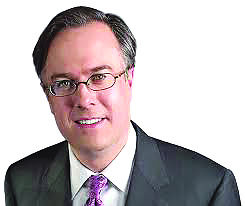BY MICHAEL GERSON
Sometimes a movement can be sabotaged by its victories. Such is the case with the Supreme Court’s Masterpiece Cakeshop ruling. The decision properly smacked down the anti-religious bigotry of the Colorado Civil Rights Commission, which not only wanted to compel baker Jack Phillips to provide a cake for a same-sex wedding but also to sneer at him in the process. The broader question — could Phillips be compelled by a non-bigoted state authority? — was left for another day. The substance of the concurrence by Justices Elena Kagan and Stephen Breyer indicates that a ruling on the underlying issue — given the current composition of the court — would be 5-4 either way, with Justice Anthony Kennedy the deciding vote.
But a focus on commercial services is ultimately unhelpful for advocates of religious liberty. This is a debate over a vanishingly small exception — the denial of artistic expression (such as cakemaking or singing) for a ceremony that an artist finds religiously objectionable. In the case of Phillips, it did not matter who actually purchased the cake. If the straight friend of a gay couple being married had paid for the cake, Phillips would still have objected. And if a gay person had bought a wedding cake for a straight couple, Phillips would have done his work.
Even if you side with Phillips, the general rule in commercial settings is clear: It is unjust (and, in any serious version of Christian ethics, immoral) to refuse the sale of goods and services to anyone simply because they are gay. And, in fact, it seldom happens.
Violence directed at gay people and the tragedy of suicide by gay teens are far more urgent problems than being refused service at the local Wendy’s.
No, the real religious-liberty issue is not discrimination in commercial settings. It is the right of religious institutions to maintain their identity — including their views on sexuality — when they interact with the public realm. Can students receive Pell Grants when they attend a religious college that regards homosexual sex as immoral? Can the government work with a religious adoption agency that only places children with a mother and father?
Here the issue is not whether you agree with such views. Rather: Does the constitutional order make a place — within limits — for institutions that don’t share the broader social consensus?
According to one form of liberalism, the answer is “no.” In this view, only individuals and the government have real, public, legal standing. Other institutions — particularly hierarchical institutions — are sources of oppression from which individuals need to be protected by the state. Religion, therefore, should be privatized as much as possible.
The alternative is a principled pluralism — which often is embraced in conservatism and in a different school of American liberalism. In this view, freedom of religion implies and requires freedom of association. People can effectively pursue their beliefs only in a community of fellow believers. And such communities — in order to maintain their identities — will have different standards than those of the public order. Religious institutions (including not only houses of worship but colleges, hospitals and charities) may hold to traditional sexual norms, or refuse to perform abortions, or forbid woman priests, or deny the Eucharist to unbelievers. In a pluralistic society, the state does not endorse such views. But it does not punish them. And more than that, it affirms that a genuinely pluralistic society is ultimately more free, virtuous and purposeful, because it is in the context of religious institutions that many people pursue the meaning that gives direction to their freedom.
Some conservatives are too pessimistic about the future of pluralism; they think all of America is on the verge of having the enforced political correctness of Evergreen State College. This is simply false. Conservatives, however, are correct about one thing. Liberals of the first, more overbearing sort may view themselves as neutral arbiters of law, but they seek to impose a set of beliefs that is no less sectarian for being secular. In some ways, they play the role of an established church, requiring people like Phillips to take part in its rites.
Particularly on the issue of gay rights, this is unnecessary. The social consensus — not least among younger religious believers — is shifting rapidly in favor of inclusion. We are headed toward an accommodation in which the majority culture accepts homosexuality, but some small communities stay out of that consensus. Attempting to pressure and compel those communities is the one thing that could make an accommodation more difficult and bitter.
Michael Gerson is a columnist for the Washington Post Writers Group. He is cohosting a new, limited-run PBS interview program “In Principle” that runs Fridays at 7:30 p.m. CST. His email address is [email protected].




